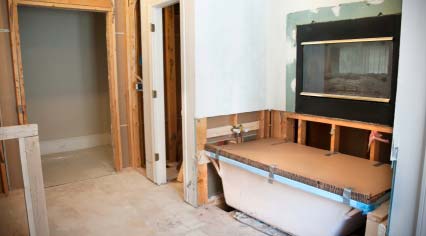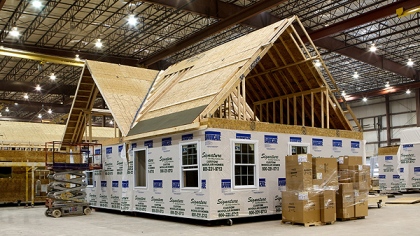Construction Loan Center
Everything You Need to Know to Remodel Your Home Successfull

Without proper planning, a home renovation can be stressful and inconvenient. In this guide, we look at everything you need to consider to pull off a successful and productive home remodel. We will cover everything from planning, hiring contractors, what upgrades you should consider and those you shouldn't, and your home remodeling loans options.
Create a Plan
Your home remodeling adventures should begin with creating a simple but clear blueprint detailing the design aspects you want to change and possible upgrades.
The plan should include a list of priorities depending on your needs and requirements. The upgrades you can’t do without should be at the top of your list. This will give you a good idea of areas with some wiggle room in your budget.
The final phase of setting your plan should be setting the budget. It’s highly recommended that you have an excess of between 10-25% to cover unexpected costs.
What and When to Renovate
Home remodeling are an exciting time for homeowners. You can’t wait to complete the renovations and enjoy the new upgrades. But careful planning will save you money, and a little patience could be the difference between a hefty bill and save hundreds of dollars.
When determining what to renovate, you need to ask yourself why you’re renovating. If you’re renovating to boost the market price of the house for a pending sale, some renovations might actually hurt the value of the house. Such renovations include:
- Too much wallpaper
- Lavish lighting
- Textured walls and ceilings
- Over-personalizing the floor
- Bright and bold paint colors
- Over-the-top high-end kitchen
- Luxury bathrooms
If you're renovating to increase the home's value, keep things simple, elegant, and neutral. This approach though simplistic, will appeal to more buyers and make your home a hot asset.
Now that you know what to renovate, you have to find the perfect time for the renovation. Summer is not the best time for a renovation. Other homeowners are also renovating, and constructions sites are at full gear. You will likely experience labor shortage, higher prices for labor and delays, on the project.
Waiting for a time when the construction is not as busy can save you money in labor and ensure you get the renovation completed on time. If you’re not in a hurry, waiting a few weeks for the season to change in your favor wouldn’t hurt.
Hiring the Contractor
Most homeowners struggle between hiring a contractor or a handyman for the renovation, more so if the renovation is minor.
In most cases, going for a general contractor is the safest route. Contractors have the training and skills to assume responsibility for small and large projects. They will also ensure the job is done to code, safely and without exceeding your budget or deadline.
You will only enjoy the convenience of working with a contractor if you choose the right one for the project. Some of the factors you should consider when selecting a contractor include:
- Whether the contractor is licensed or certified
- Do they have liability insurance?
- If they will handle the building permits
- If they have worked on similar projects before
- Is the contractor going to have a dedicated team to work on the project, or will they use sub-contractors?
- How does the contractor handle change orders?
- Do you offer extended warranties?
- How do you resolve conflicts?
These considerations will help you find qualified contractors. If it's your first time hiring a contractor, it's best to go with a referral from a friend or family member. It will save you time and frustration.
Handling the Demo
This is where most home renovations start going south. Although the demo seems like the simplest stage of a renovation, most homeowners don't plan adequately, and it ends in an epic fail. It would be perfect if your contractor would handle the demo as well. It would save you a lot of problems. But if you would rather hire a separate contractor for the demo or do it yourself, there are a few things you need to keep in mind:
- Have a detailed inventory – An inventory for everything you will need for the demo if you intend to do it yourself is critical. It will let you know if you should go ahead and strip down the house yourself or you need professional help. If you have to hire the equipment, it’s always to let professionals handle the job.
- Always do the math – Demo companies are crafty. Don’t be sold by the lowest figure you get. Some will have small dumpsters that fill up quickly and charge you extra for multiple trips. Ask a lot of questions and determine exactly what you’re paying for before making any decisions. What seems affordable might quickly balloon when the demo starts.
Financing Your Remodeling Project
Once you have everything planned out and have a cost estimate, you quickly realize the renovation isn't as cheap as you thought. If you have saved up for it, excellent! If you haven’t, there are a few home remodeling loan options.
You could refinance your home. If it doesn’t make sense or if you’re not yet eligible, you could consider taking out a remodeling loan. Home Remodel loans are often confused with home equity loans or home equity lines of credit. Although they are similar in many aspects, there are differences between home remodel loans, home equity loans and home construction remodeling loans, that should guide you on which loan to take depending on the extent of the remodel.
What is a remodeling loan?
A home remodeling loan allows you to borrow funds based on the post-renovation value of the home. This type of loan doesn’t require you to make any payments during the remodeling period. Just like remodeling, you need to carefully weigh your options when taking out a loan for remodeling to have an amazing first-hand home remodeling loan experience.
Final Thoughts
Once you have your finances in place, your remodel should go on smoothly. With the remodeling loan, you should know that the funds will be released to the contractor in phases depending on the progress of the remodel.






